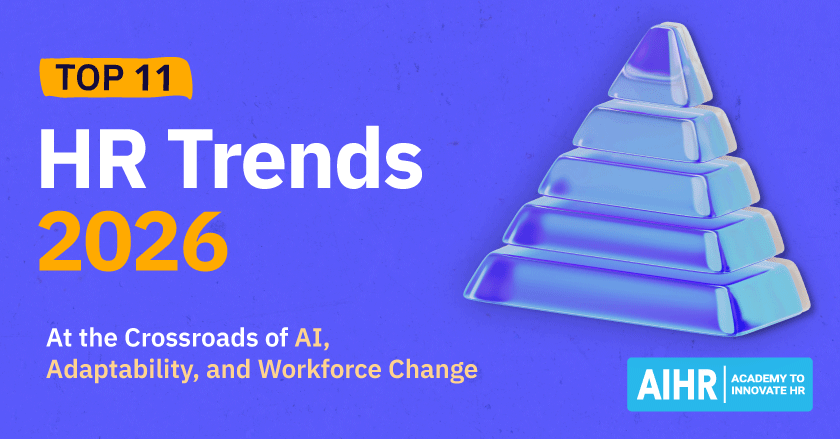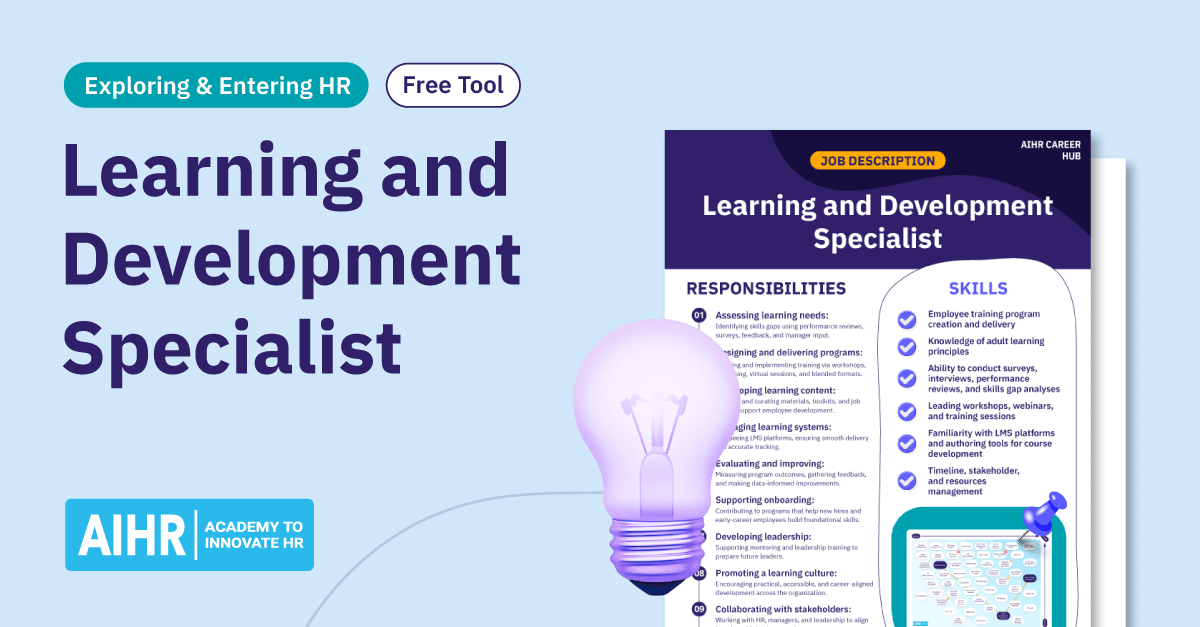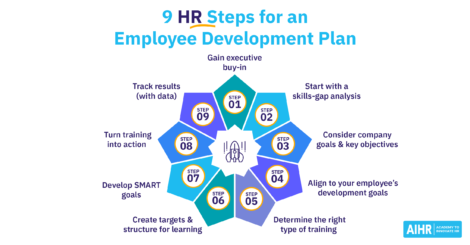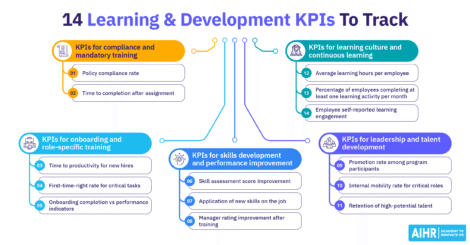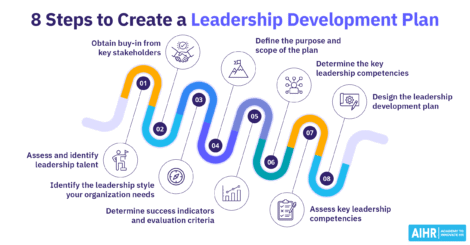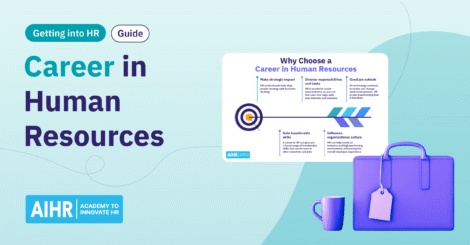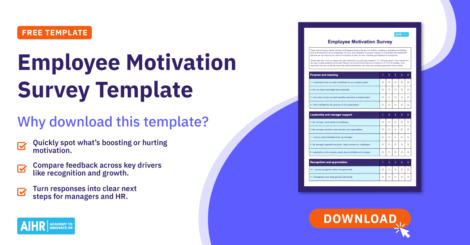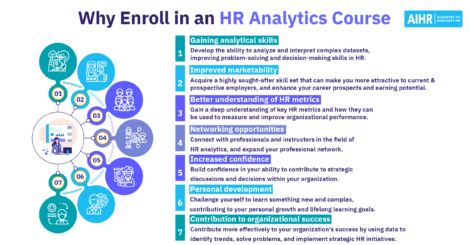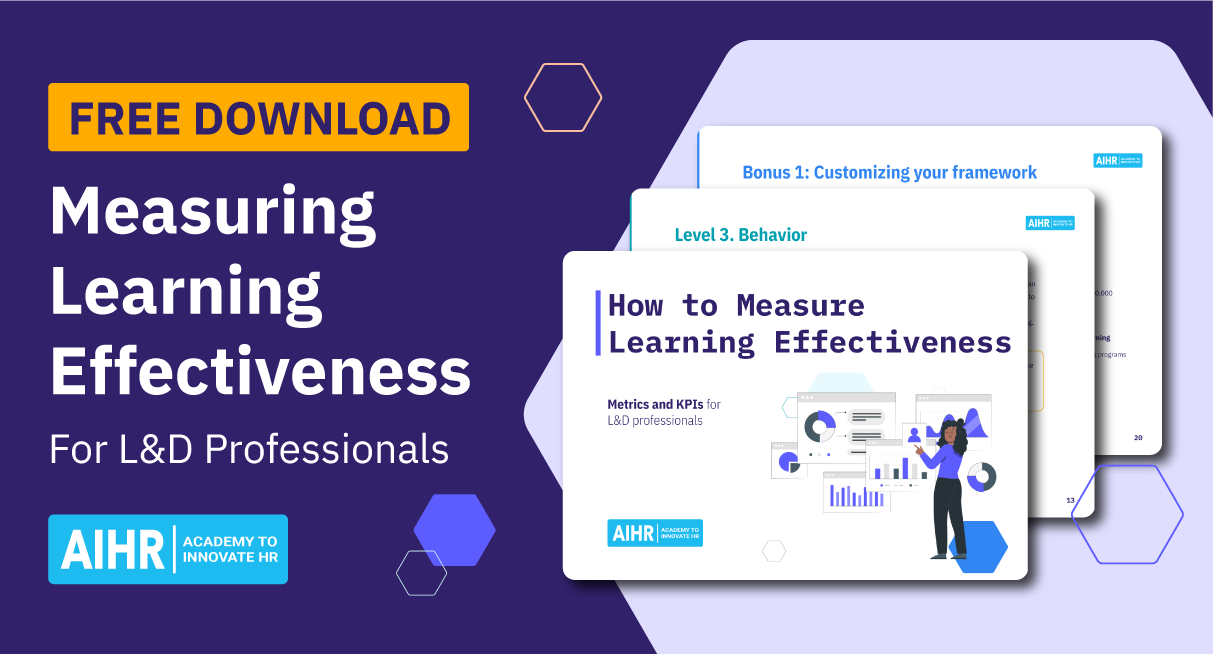Learning and Development Specialists play a key role in helping organizations attract, retain, and develop top talent. Employees increasingly expect opportunities to upskill and advance their careers, and research shows just how much learning matters to them. According to LinkedIn’s Workplace Learning Report, 7 in 10 employees say learning improves their sense of connection to their organization, and 8 in 10 say it adds purpose to their work.
The same report found that 94% of employees are more likely to stay with employers who invest in their professional growth. This investment not only strengthens loyalty but also drives measurable business results, as companies that prioritize L&D consistently report higher profitability.
Contents
What is a Learning and Development Specialist?
What does a Learning and Development Specialist do?
Job description of a Learning and Development Specialist
Average Learning and Development Specialist salaries
What qualifications do you need to become an L&D Specialist?
The skills and competencies an L&D Specialist needs
AIHR certificate programs to boost your career
Career paths for Learning and Development Specialists
What is a Learning and Development Specialist?
A Learning and Development (L&D) Specialist is a professional responsible for designing, implementing, and managing initiatives that help employees build skills, enhance their performance, and grow in their careers. Their role goes beyond organizing training sessions; it involves understanding the organization’s goals, identifying skills gaps within the workforce, and creating programs that align employee growth with business strategy. L&D Specialists act as a bridge between leadership and employees, ensuring that professional development opportunities are relevant and accessible and directly support the organization’s broader objectives.
What does a Learning and Development Specialist do?
On a daily basis, an L&D Specialist designs and delivers programs that help employees build skills, improve performance, and grow in their careers, while aligning with the organization’s strategic goals. They assess workforce needs, develop and implement training initiatives—from workshops and e-learning to coaching and leadership development—and measure their impact to support both engagement and business outcomes.
This involves analyzing performance data, employee feedback, and industry trends to identify where development is needed most. Based on these insights, they create tailored programs such as e-learning modules, mentoring opportunities, and leadership pathways. Increasingly, they use tools like learning management systems (LMS) and AI-powered platforms to personalize learning and track its effectiveness.
Beyond program design, successful L&D Specialists promote a culture of continuous learning by making opportunities practical, engaging, and relevant to employees’ career goals. They also evaluate the success of these initiatives by monitoring metrics like skill growth, retention, and productivity to ensure the organization is getting measurable value. The role combines strategic thinking with hands-on execution and calls for a solid mix of business acumen, instructional design skills, and an understanding of how people learn best.
Job description of a Learning and Development Specialist
Let’s take a closer look at what this role typically involves. While responsibilities may vary depending on the organization, a well-rounded L&D Specialist job description usually includes the following components:
- Learning needs assessment: Identify development needs through employee performance reviews, feedback surveys, skills gap analysis, and conversations with managers and employees.
- Program design and delivery: Create and deliver learning programs that meet employee and business needs, using formats such as workshops, virtual classrooms, e-learning, and blended learning.
- Content development: Develop and curate learning materials, job aids, toolkits, and other resources that support on-the-job learning and long-term growth.
- Technology and systems management: Oversee learning platforms like LMS systems, ensuring accurate tracking, smooth delivery, and a user-friendly learning experience.
- Measurement and improvement: Track participation, gather feedback, and assess outcomes to evaluate the effectiveness of learning initiatives and make data-driven improvements.
- Onboarding and early-career support: Contribute to onboarding programs and learning experiences that help new hires ramp up and early-career employees build foundational skills.
- Leadership development: Support leadership training and mentoring initiatives that prepare current and future leaders for expanded roles.
- Culture of continuous learning: Promote practical, accessible, and career-aligned development opportunities across the organization to help foster a learning-first mindset.
- Stakeholder collaboration: Partner with HR, managers, and leadership to ensure learning strategies align with talent priorities and business goals.
Trends and innovation: Stay informed about the latest in L&D, such as AI-powered platforms, microlearning, and personalized learning, to keep programs relevant and practical.
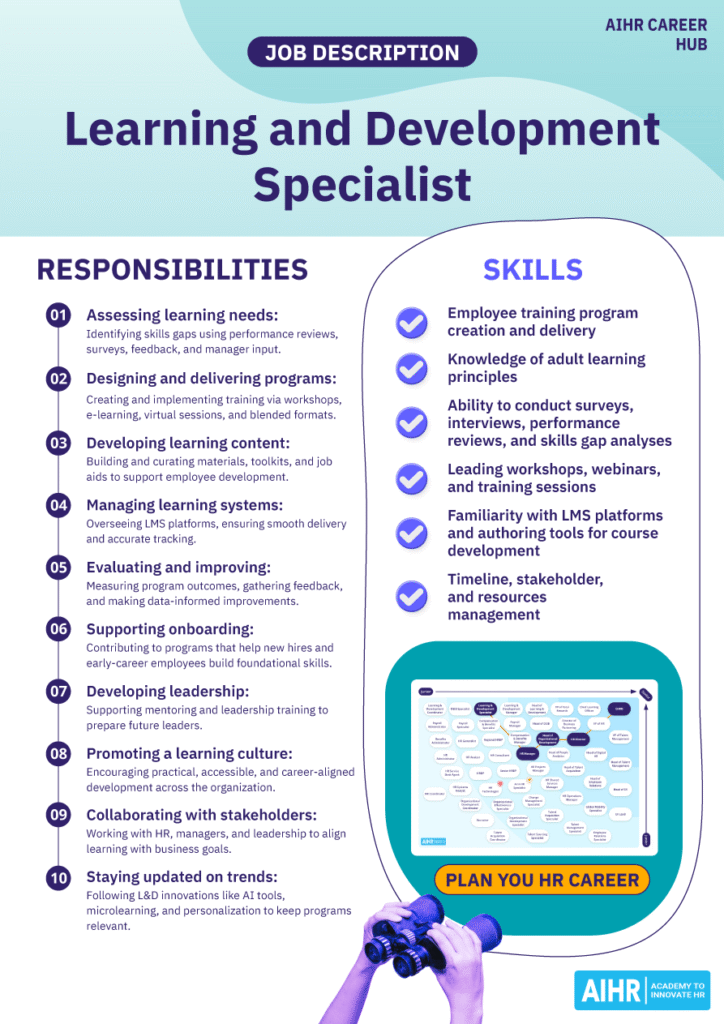
Average Learning and Development Specialist salaries
As of mid this year, Learning and Development Specialists in the United States earn between $72,997 and $91,196 annually, depending on the individual’s experience, industry, and location.
According to the U.S. Bureau of Labor Statistics, the median annual wage for comparable roles in the Training and Development Specialist category is $65,850.
Geography has a strong impact on pay. Specialists in states like New Jersey, California, and Washington, DC tend to earn above the national average. For example, the average salary in New Jersey is approximately $100,039.
Build your expertise in corporate learning and development
To design impactful learning programs that support both employee growth and business objectives, you need to combine strategic planning with practical skills in needs analysis, instructional design, and learning evaluation.
✅ Conduct effective learning needs assessments to target skill gaps
✅ Design engaging training programs using proven instructional design models
✅ Evaluate learning initiatives to measure impact and improve future programs
✅ Align L&D strategies with broader organizational goals for measurable business results
🎓 Advance your HR career with the flexible, online Learning and Development Certificate Program.
What qualifications do you need to become an L&D Specialist?
To become a Learning and Development Specialist, a strong educational background combined with relevant work experience is typically expected. Most employers look for candidates who have a degree in a related field and have hands-on experience in learning, training, or instructional design. Additional certifications and technical knowledge can help demonstrate expertise and make candidates more competitive in a growing, technology-driven field.
Common qualifications include:
- Two to five years of experience in learning and development, instructional design, corporate training, or a related HR function.
- A bachelor’s degree in Human Resources, Education, Organizational Psychology, Business, or a related field.
- A master’s degree in Organizational Development, HR, Adult Education, or a similar discipline is preferred by many employers.
- Professional certifications in learning and development or instructional design, such as AIHR certifications, ATD (Association for Talent Development), CIPD (Chartered Institute of Personnel and Development), and SHRM (Society for Human Resource Management) certifications.
- Formal training in instructional design, adult learning principles, or the use of learning technologies.
- Experience working with learning management systems (LMS) and e-learning authoring tools like Articulate or Captivate.
- Familiarity with instructional design methodologies such as ADDIE, SAM, or Kirkpatrick’s evaluation framework.
- Demonstrated ability to develop and deliver learning solutions across multiple formats, including e-learning, classroom, and blended learning environments.
The skills and competencies an L&D Specialist needs
In addition to formal qualifications, Learning and Development Specialists need a combination of technical skills and personal attributes to succeed. These include the ability to design effective programs, leverage learning technologies, and measure outcomes, alongside strong communication, collaboration, and adaptability. Together, these skills and competencies help L&D professionals create engaging, impactful learning experiences that align with organizational goals.
Skills
- Training program design: Creating and delivering learning initiatives tailored to employee needs and organizational objectives.
- Instructional design: Applying adult learning principles to build engaging, outcome-focused content across in-person, e-learning, and blended formats.
- Needs assessment: Conducting surveys, interviews, performance reviews, and skills gap analyses to align development efforts with business priorities.
- Facilitation: Leading workshops, webinars, and training sessions in a clear, engaging, and impactful way.
- Learning technologies: Using LMS platforms such as Moodle, Cornerstone, or Docebo, and authoring tools like Articulate, Captivate, or Canva.
- Program evaluation: Applying models like Kirkpatrick’s to assess effectiveness, measure learning outcomes, and improve future initiatives.
- Project management: Managing timelines, resources, and stakeholders to take programs from concept to implementation smoothly.
Core competencies
- Communication: Conveying ideas clearly and engaging both learners and stakeholders.
- Empathy and trust-building: Understanding learner needs and creating a supportive, inclusive learning environment.
- Analytical thinking: Interpreting data to identify learning needs, evaluate results, and demonstrate program impact.
- Continuous learning: Staying current with L&D trends and seeking opportunities to build expertise.
- Strategic alignment: Building strong relationships with managers, HR, and leadership to ensure learning supports business goals.
- Adaptability: Adjusting to new technologies, changing workforce expectations, and shifting organizational priorities.
- Collaboration: Working effectively with cross-functional teams to design, deliver, and improve learning programs.
HR tip: Build your strategic and analytical capabilities
Strong L&D professionals do more than just design engaging training. They connect learning initiatives to business outcomes such as employee retention, productivity, and internal mobility. Strengthening your data literacy, including the ability to track employee performance metrics and measure ROI using models like Kirkpatrick’s, will help you communicate effectively with leadership and gain support for your programs.
AIHR certificate programs to boost your career
AIHR’s programs equip HR professionals with the skills to design impactful learning experiences, support organizational growth, and align talent strategies with business goals. Whether you want to move into Learning and Development (L&D), earn a promotion, or increase your salary, these programs help you gain the technical know-how, strategic insight, and practical experience to get there.
- Learning & Development Certificate Program: This program is specifically designed for those aiming to advance their careers in L&D. It covers identifying skills gaps, creating L&D strategies, using data analysis to assess programs, and includes hands-on projects, access to a resource library, and a peer community.
- Organizational Development Certificate Program: This program is valuable for L&D specialists as it focuses on organizational development, which is closely linked to learning initiatives, change management, and building a learning culture.
- T-Shaped Competency Framework: While not a certificate program itself, this resource outlines the core competencies and skills needed for impactful HR functions, including L&D. It can help you identify areas to focus on as you develop your L&D expertise.
Career paths for Learning and Development Specialists
Learning and Development offer strong career versatility, with a clear route for advancement and plenty of options to explore other areas within HR and organizational development. L&D professionals build expertise at the intersection of people, performance, and strategy, making their skills valuable across a wide range of industries and roles.
As you progress, you might move into leadership positions such as HR Manager. You can also branch into related fields like HR Organizational Development to broaden your experience. This variety allows you to shape a career that grows with your interests while increasing your earning potential and expanding your impact across the business.
Entry-level roles (building foundations)
- L&D Administrator: Manages training logistics, maintains learning records, and supports the coordination of learning programs.
- Training Facilitator: Delivers workshops and training events, building experience in engaging learners and supporting program delivery.
Mid-career roles (specializing and growing)
- Learning and Development Specialist: Designs and delivers programs, conducts needs assessments, and evaluates training impact.
- HR Manager: Plans, directs, and coordinates the HR department’s administrative functions, including recruitment, employee training, and compensation and benefits administration.
Senior roles (leadership and strategy)
- HR Director: Responsible for the HR department’s policies, activites, and staff. They contribute to the overall company strategy by advising the board on the HR implications of its decisions.
- Chief HR Officer (CHRO): Leads an organization’s people strategy, and oversees talent management, culture, employee experience, and HR operations to support business goals.
Lateral and cross-functional moves (broadening career options)
- HR roles: Transition into broader HR positions such as HR Generalist or HR Business Partner, applying your understanding of people development to workforce planning, employee engagement, and talent strategy.
- Organizational Development (OD) roles: Move into roles like Head of Organizational Development, focusing on business transformation, cultural initiatives, and organizational performance improvement.
- Talent management or employee experience roles: Shift into positions dedicated to employee engagement, leadership development, and retention, where your L&D background supports building a stronger employee value proposition (EVP).
- Consulting and independent practice: Use your L&D expertise to work as a consultant, coach, or independent trainer, advising organizations on their learning strategies or designing tailored development programs.
Next steps
Becoming an L&D Specialist requires you to grow your skills and take on new challenges. Start by identifying the areas where you want to improve, whether it’s instructional design, data and analytics capabilities, or using AI tools to personalize and scale learning experiences. You can then enroll in a certification program (such as AIHR’s Learning and Development Certificate Program) to gain practical skills and strategic insight.
Use resources like the T-Shaped HR Competency Framework to map your development, set priorities, and focus on the capabilities that will help you stand out. Investing in your own growth now will prepare you to lead meaningful learning initiatives, move into senior roles, and build a future-proof HR career .


